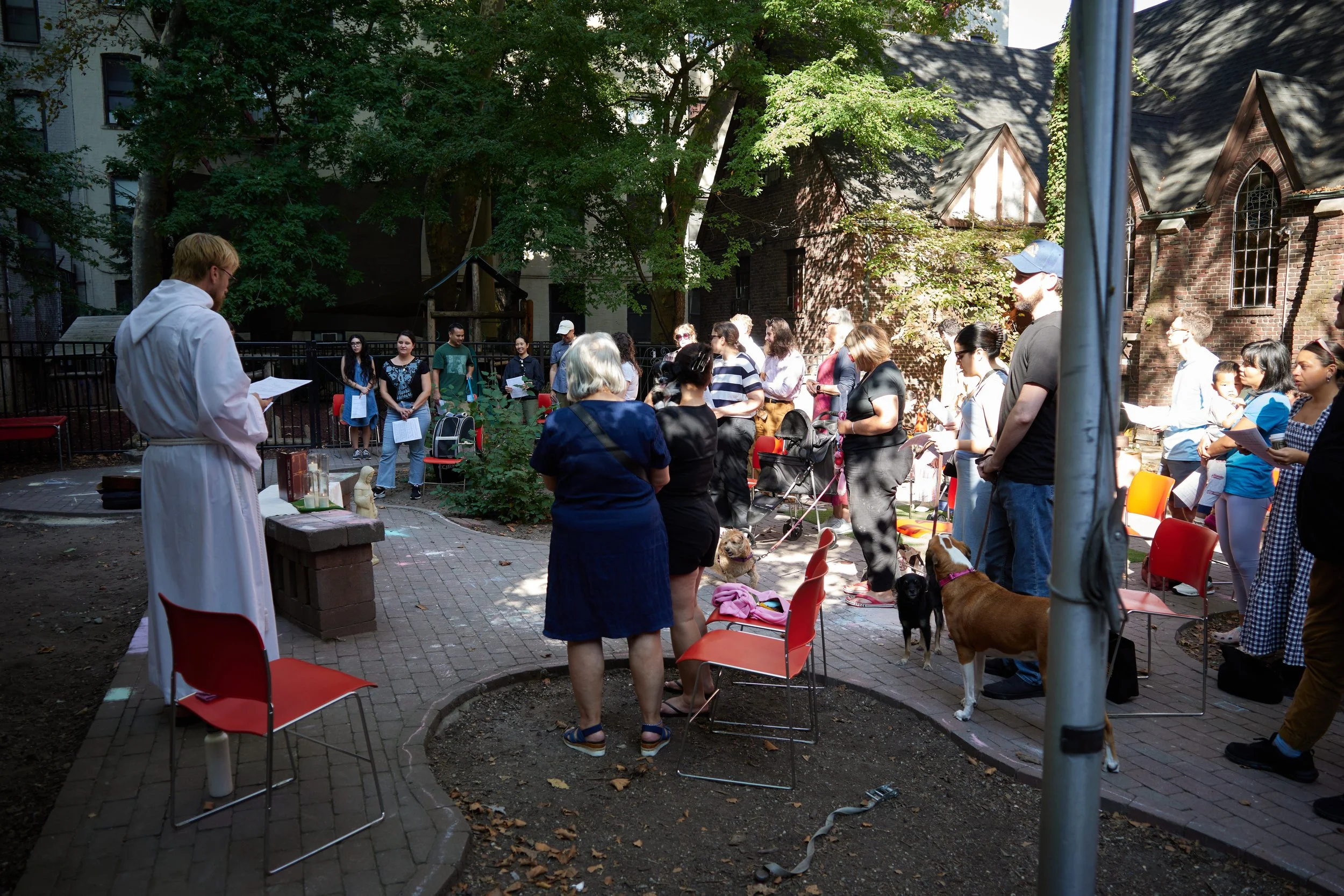“But ask the animals, and they will teach you…”
Our Blessing of the Animals on October 5, 2025;
photo by Spence Moore
Wonderings…
I wonder if you’ve ever experienced awe in the presence of an animal, or out in nature…
Reflection on this Wondering + Texts for The Feast of St. Francis
Job 12:7–10a; Luke 12:22-32
Let us speak, and listen, held in the presence of our loving, liberating, and life-giving God. Amen.
It fits that many churches do a Blessing of the Animals to honor Saint Francis of Assisi. St. Francis loved animals, and spent time speaking with and listening to animals. And he learned from them. In the way St. Francis lived, we can see some of the wild playfulness and loyalty of dogs, the shy curiosity and relational attention we see with cats, the closeness to the earth we see in reptiles, the freedom and grace we see in birds.
He wasn’t always this way. St. Francis was born in 1181 in Italy: the pampered son of a wealthy cloth merchant. As a young man, he partied hard, and tried to gain some military glory, but failed, ending up in jail. His dad bailed him out, and the assumption was that Francis would eventually take over the family business. But something was happening within Francis; especially when he saw poor people begging for food, or when he saw people with leprosy; he could not shake the growing sense that these suffering human beings were Christ himself suffering, and Francis was compelled to help, and to share in solidarity with all who suffered. He devoted himself to God and to a life of total poverty.
And for the rest of his life, Francis refused to touch money; he begged for food on the street every day. That is, he lived out the kind of wild trust that Jesus invites all of us into in today’s Gospel lesson. “Do not worry about your life, what you will eat, or about your body, what you will wear. For life is more than food, and the body more than clothing….Look at the birds of the air, the lilies of the field”—they’re doing just fine. Look how beautiful they are, what ease they have.
If we all were able to loosen our grip, to open up our hands even just a little bit, we’d discover a bit of that ease; we’d discover that we live in abundance—and there is more than enough to go around.
Francis lived in a time when the major currents of Christian thought and practice were focused on a world beyond this one, were focused on heaven or hell. People were focused on pleasing a god who they imagined as far, far away in inaccessible perfection. But Francis experienced God’s presence right here, in the natural world. In the miracle of his own heartbeat, in flocks of birds in flight, in goats giving birth to kids, in the moss and lichen that grew in the caves where he often slept. Francis lived his life in solidarity with every human being who has a vulnerable, mortal body—that is, everybody. Remember, even Jesus had a vulnerable, mortal body.
Scripture tells us repeatedly that the path of life is not to set ourselves apart from creation—neither to flee from it nor to lord over it—but to sink deeper into its rhythms and cycles, to obey its ways. Francis saw this so clearly. The lilies of the field fling open their blossoms for bees to come and spread their pollen around; they turn toward the sun, then they close up at the end of the day… But how many of us are…going, going, going…? Just riding the waves of anxiety—knowing only that we don’t know what we really need? Don’t know where to turn for what we really need?
But other creatures know what they need, and they are sensitive to what others need: how many of you with non-human companions here today have experienced love and grace through those animals? Has your pet sensed your distress, or need for connection? Has your pet reminded you of what really matters when you’ve lost perspective?
I wonder if our gospel lesson today is telling us to be more like these animals we love—caring for ourselves and others day by day, letting our worries blow away on the wind.
“But ask the animals, and they will teach you; the birds of the air, and they will tell you; ask the plants of the earth, and they will teach you; and the fish of the sea will declare to you” the glory of God, the vulnerability of God, the mutuality and interdependence and effortless complexity of God. The nearness of God in the sun and the rain, in this breeze filling our lungs this very moment.
Amen.
